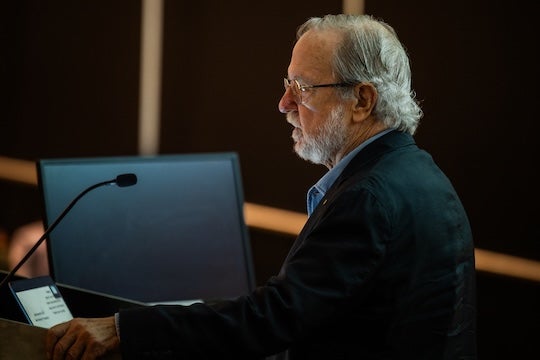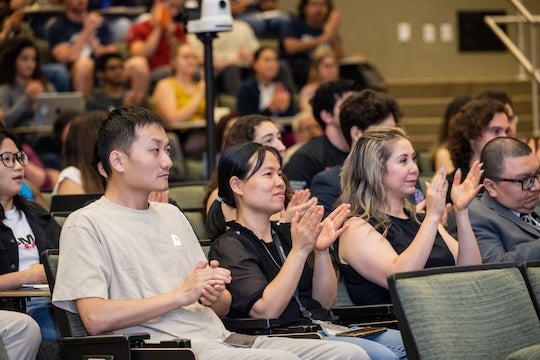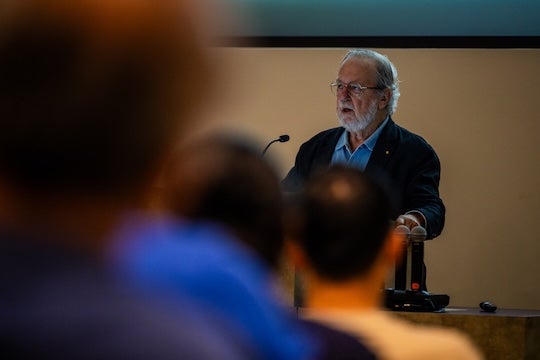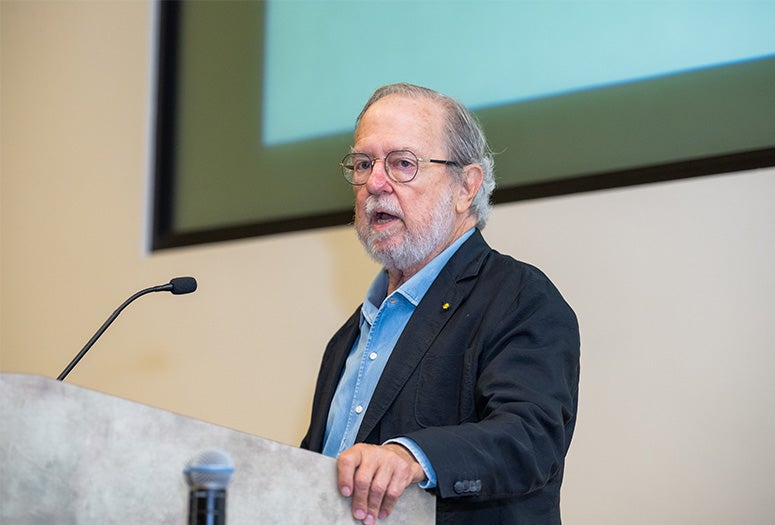The Cancer Bioengineering Collaborative, an initiative of Rice University and The University of Texas MD Anderson Cancer Center, launched its inaugural seminar June 3 with an invited talk from James P. Allison, who was jointly awarded the 2018 Nobel Prize in physiology or medicine for discoveries that launched the field of cancer immunotherapy. Established in 2024, the Cancer Bioengineering Collaborative aims to bridge the worlds of engineering and oncology in pursuit of next-generation tools for diagnosing, monitoring and treating cancer.

The event drew a packed house and was Allison’s first lecture on the Rice campus. The event opened with remarks by Sharon Pepper of Rice’s ENRICH office and Ramamoorthy Ramesh, Rice’s executive vice president for research, who described the collaborative as an example of the university’s sharpened focus on solving generational challenges through cross-institutional partnerships.
Jeffrey Molldrem, chair of hematopoietic biology and malignancy at MD Anderson and co-director of the collaborative, introduced Allison by tracing the impact of his pioneering research on T cells, the immune system’s sentinels and the development of immune checkpoint blockade therapy, which has revolutionized cancer treatment for hundreds of thousands of patients.
“Curiosity-driven science, when nurtured in the right environment, can change the world,” Molldrem said, calling Allison “the perfect person to launch this series.”
Allison is regental professor and chair of immunology, vice president of immunobiology and director of the James P. Allison Institute at MD Anderson. His talk, titled “Immune Checkpoint Blockade in 2025: Opportunities for More Cures,” offered a wide-ranging overview of how immunotherapy developed, from early T cell research in the 1980s to the latest advances in the field. Drawing on decades of research, Allison explained how immunotherapy, rather than targeting a specific cancer-causing mutation, focuses on empowering the immune system itself to recognize and destroy cancer cells.
“The work I did was prompted by curiosity: How do T cells work? We didn’t know anything about it,” Allison said. “But because I lost my mother and two uncles and my brother to cancer, I had cancer on the back of my mind.”

Allison shared how his research led to the development of ipilimumab, a drug that blocks CTLA-4, a protein that inhibits T cells from attacking cancer. By “taking the brakes off the immune system,” the therapy allows T cells to mount a full-scale assault on tumors — and to remember those targets in the future.
“We’re not treating the cancer cell; we’re treating the immune system,” Allison explained. “Once T cells are activated, they can persist for years. We’ve seen patients go more than a decade without recurrence.”
One of the most compelling examples was the story of Sharon Belvin, a young woman with advanced metastatic melanoma who received a single round of immunotherapy after other treatments failed.
“She almost broke my rib giving me a hug when I met her,” Allison recalled. “She’s 21 years out [from the diagnosis], married with kids — all after one treatment.”
While checkpoint blockade therapies have shown remarkable results — with more than 300,000 patients achieving long-term remission through 2023 — Allison acknowledged their limitations. Only about 20% of patients respond, and some cancers, like pancreatic cancer and glioblastoma, remain particularly resistant. He emphasized the importance of continuing to study the immune system’s complexity and identifying new targets and strategies to broaden the therapy’s effectiveness.
The talk also touched on new frontiers, including combination therapies that add multiple checkpoint inhibitors, strategies that integrate immunotherapy with surgery and efforts to personalize treatment based on tumor biology. One promising avenue involves identifying immune cell markers, such as ICOS, that can help determine which patients are most likely to respond to treatment.

“Our approach now is to run small, mechanistically informed trials,” Allison said of his namesake institute at MD Anderson. “We’re not just looking for responses — we’re looking at why something worked or didn’t, so we can build smarter treatments.”
Although he was unable to attend the event in person, Gang Bao, Rice’s Foyt Family Professor of Bioengineering, professor of chemistry and materials science and nanoengineering and co-director of the Cancer Bioengineering Collaborative, joined over Zoom to offer his thanks to Allison for leading the inaugural seminar and to offer closing remarks.
Angel Martí, professor of chemistry, bioengineering, materials science and nanoengineering and chair of Rice’s Department of Chemistry, described his impression of the seminar as “really inspiring.”
“It’s amazing that we can use these kinds of immunotherapies to get the body to react and respond to treat these cancers,” he said.
- Access associated media files:

